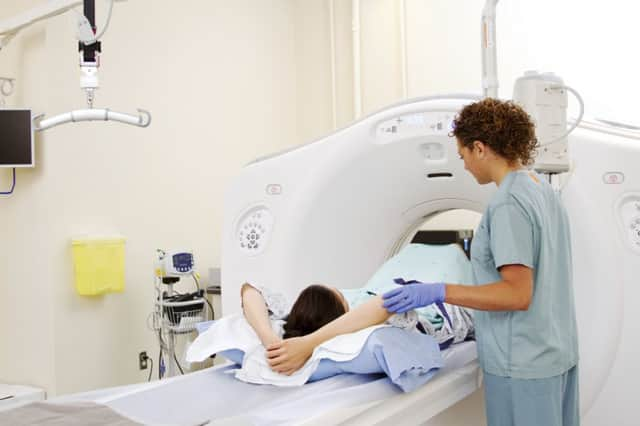MRI research to lower stillbirth rates in Scotland


The research team, at Tommy’s research centre at the Edinburgh Royal Infirmary, have used advanced magnetic resonance imaging to examine the placental health of expectant mothers.
Fifty healthy pregnant women have so far taken part and scientists hope their findings can be used to help prevent stillbirth by appropriately timing the delivery of babies that are too small.
Advertisement
Hide AdAdvertisement
Hide AdScientists also hope to extend the pilot to examine women who have problems in their pregnancies.
Scotland has one of the highest rates of stillbirth rates in the developed world, with one in 200 pregnancies ending in a stillbirth – ten times as many as those who die of cot death.
Currently pregnant women are offered routine ultrasound, but researchers warn that these scans can be limiting as they don’t provide a full and detailed image of the baby.
Many pregnancy complications, such as pre-eclampsia, fetal growth restriction and diabetes, are associated with poor placental function but there are no tests currently available which are able to assess placental function and a diagnosis of a “sick” placenta is often made relatively late in pregnancy
MRI scans use strong magnetic fields and radio waves to produce detailed images of the inside of the body. They are safe to use in pregnancy as they do not involve exposing the body to X-ray radiation.
The study, co-funded by Tommy’s and Action Medical Research, hopes to allow medical experts to identify those babies who are unwell and would benefit from an early delivery, and those who are healthy and should stay in utero.
The multidisciplinary team includes medical imaging experts, radiologists and specialist clinicians.
What these researchers have found is that placental metabolism is different in babies who are small compared with those who are appropriate size for their gestation. They aim to use this information to help prevent future stillbirths.
Advertisement
Hide AdAdvertisement
Hide AdDr Fiona Denison, senior lecturer and honorary consultant in maternal and fetal medicine, led the study at the University of Edinburgh’s Clinical Research Imaging Centre.
Denison said the scans could help improve the long-term health of babies and children in Scotland.
She said: “Although ultrasound scans give us lots of useful information, they are not able to tell us whether a placenta is healthy or not.
“Babies who are too small or born too early can potentially have problems. We are investigating whether MRI can tell us if a placenta is working or not.
“It is all quite new, and advanced MRI techniques are at a developmental research stage. We are looking at whether we can see differences in placental health and although our research is at an early stage, so far it had been quite promising. We think there is potential in it.
“MRI is safe in pregnancy. In the future we hope that the information it gives us might help us work out the best time to deliver babies, improving the long-term health of babies and children. It is very exciting,” she added.
Unable to eat or breath by itself, an unborn baby depends on the placenta to survive. The placenta brings a constant supply of oxygen and nutrients and if it stops working well, babies start to struggle in the womb.
Poor functioning of the placenta – which is a common feature of several different pregnancy complications – can be notoriously difficult to detect and there is often no way to tell how badly mother and baby might be affected.
Advertisement
Hide AdAdvertisement
Hide AdDr Caroline Johnston, research evaluation manager at Action Medical Research, said: “Around 4,000 babies are stillborn in the UK every year and many other babies who stop growing properly within the womb have to be born prematurely, in an attempt to save their lives.
“Such devastating pregnancy complications often result from problems with the placenta, and other babies stop growing and are born prematurely.
“The team’s ultimate aim is that MRI scans will be able to inform doctors of a baby’s progress in the womb so that they’ll be better placed to decide whether to let the pregnancy continue or deliver it early. This knowledge could prove life-saving. Action Medical Research are delighted to be able to fund this research. We hope the work can help detect problems and identify unborn babies who are at risk, saving the lives of more babies.”
FOLLOW US
SCOTSMAN TABLET AND MOBILE APPS